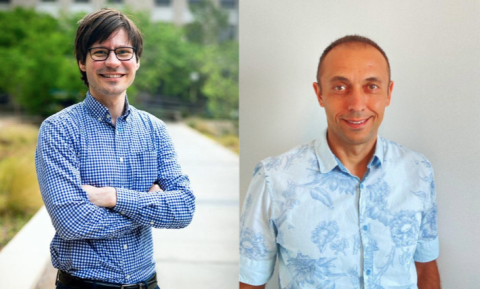Two SSE Faculty Awarded Spring 2025 Provost’s Proof of Concept (PPOC) Funds!
At Tulane University, support for research and technology development is accelerating, with growing momentum among faculty to translate their work into real-world solutions. Across disciplines, researchers are converting factory emissions into sustainable fuel sources, developing personalized reproductive health applications that adapt to each woman's experience, and building data systems resilient to digital interference.
These three projects were recently awarded a combined $150,000 through the Spring 2025 Provost’s Proof of Concept (PPOC) Fund, administered by the Tulane Innovation Institute’s Robert L. Priddy Innovation Lab. Now in its fifth cycle, the initiative supports academic discovery with clear potential for practical application. The latest recipients were announced during the Open Medical Innovation Challenge (OPEN MIC) Night on Wednesday, April 9, 2025, as part of Tulane’s Research, Innovation, and Creativity Summit (TRICS).
The Spring 2025 PPOC recipients each received $50,000, which will help them further develop their work by gaining more staff support and conducting market research.
Dr. Matthew Montemore, School of Science and Engineering
Efficient Conversion of CO₂ to Ethanol
Dr. Montemore’s team has developed a trimetallic nanoparticle catalyst—a precisely engineered combination of three metals at the nanoscale—that accelerates the chemical conversion of carbon dioxide into ethanol. Their technology achieves 75% selectivity at high reaction rates, producing nearly pure product streams while efficiently forming multi-carbon molecules. This innovation outperforms current CO₂-to-ethanol conversion methods and may offer a practical way to repurpose industrial carbon emissions into a valuable product, such as vehicle fuel or an intermediate for further chemical upgrading.
The PPOC funding will support a postdoctoral researcher focused on expanding intellectual property protection, identifying additional catalytic materials, conducting techno-economic analysis, and engaging with industry partners to align development with market needs.
Dr. Margaret Mary Downey, School of Social Work
The Journey App
The Journey App is a comprehensive digital platform designed to support users through key stages of reproductive health. It integrates contraception, fertility planning, and pregnancy resources in one place while acknowledging that every journey is unique. Dr. Downey and her team will use the PPOC grant to transition the app from concept to prototype. The work will include customer discovery to validate demand, usability testing to refine core features, and business model development to ensure long-term sustainability and user trust.
Dr. Mahir Bilen Can, School of Science and Engineering
SPARC: Shortest Path and Antichain for Reliable Communication
In an era of critical data security and reliability, Dr. Can’s SPARC project introduces new mathematical tools that improve how error-correcting codes (ECCs) handle signal degradation. These tools—the shortest-path metric and the antichain metric—extend the classical Hamming metric to provide enhanced protection against errors in digital communication. Error-correcting codes are ubiquitous, playing a vital role in diverse fields such as banking, healthcare, streaming, and texting, and they are indispensable for advancing technologies like quantum computing. SPARC's methods seek to enhance such commercial applications of error-correcting codes by innovating on underlying metric structures and introducing new ECCs that surpass existing standards. These advancements significantly improve data integrity and resilience, ensuring that messages remain intact even when portions of the signal are lost or disrupted. With PPOC support, Dr. Can's team will develop commercially viable decoders incorporating newly designed error-correcting codes and a software library that utilizes advanced metrics to adapt new codes for various channel setups. The team will also conduct targeted customer discovery and engage with potential industry collaborators.

